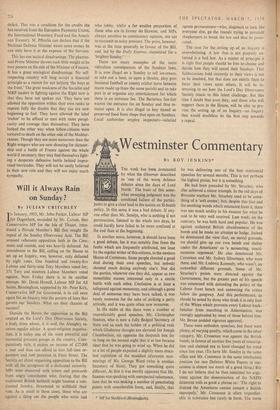Will it Always Rain on Sunday?
By JULIAN CRITCHLEY N January, 1953, Mr. John Parker, Labour MP Ifor Dagenham, seconded by Mr. Carson, then Conservative MP for the Isle of Thanet, intro- duced a Private. Member's Bill that sought the repeal of the Sunday Observance Acts. The Bill aroused vehement opposition both in the Com- mons and outside, and was heavily defeated. An amendment to the Bill, calling on the House to set up an Inquiry, was, however, only defeated by eight votes. One hundred and twenty-five Labour and thirty-nine Tory Members voted for; 151 Tory and nineteen Labour Members voted against. Next Friday there is to be another attempt. Mr. Denis Howell, Labour MP for All Saints, Birmingham, supported by Mr. Peter Kirk, Conservative MP for Gravesend, is to call once again for an Inquiry into the pattern of laws that govern our Sundays. What are their chances of success?
Outside the House the opposition to the Bill centred on the Lord's Day Observance Society, a body from whom, it is said, the Almighty re- ceives regular advice. A quasi-religious organisa- tion, it is today one of the most powerful and successful pressure groups in the country. Com- paratively rich, it enjoys an income of £27,000 a year and thus can afford to hire full-time or- ganisers and rent premises in Fleet Street. The Society set about organising opposition to the Bill with all the arrogance of a dedicated minority. MPs were showered with letters and postcards from angry constituents who, fearing that the traditional British Sabbath might become a con- tinental Sunday, threatened to withhold their vote. As is usual in these cases, those who are against a thing are the people who write and who lobby, whilst a far smaller proportion of those who are in favour do likewise; and MPs, always sensitive to constituency opinion, are apt to succumb to noisy pressure. The press, however, was at the time generally in favour of the Bill, and, led by the Daily Express, clamoured for a `brighter Sunday.'
There are many examples of the more ridiculous consequences of the Sundays laws. It is now illegal on a Sunday to sell ice-cream, to take out a boat, to open a theatre, play pro- fessional football or county cricket (save between teams made up from the same parish) and to take part in or organise any entertainment for which there is an entrance fee. The Battersea fun-fair waives the entrance fee on Sunday and thus re- mains open. It is also illegal to buy tinned or preserved food from shops that open on Sundays. Local authorities employ inspectors—salaried agents provocateurs—who, disguised to look like everyone else, go the rounds trying to persuade shopkeepers to break the law and thus be prose- cuted.
The case for the ,setting up of an Inquiry is overwhelming. A law that is not properly en- forced is a bad law. As a matter of principle it is right that people should be free to choose and decide how they will spend their Sundays. That Sabbatarians hold sincerely to their views is not to be doubted, but that does not entitle them to force their views upon others. It will be in- teresting to see how the Lord's Day Observance Society reacts to this latest challenge. But this time I doubt that even they, and those who will support them in the House, will be able to pre- vent the setting up of an Inquiry—an Inquiry that would doubtless be the first step towards a repeal.


































 Previous page
Previous page